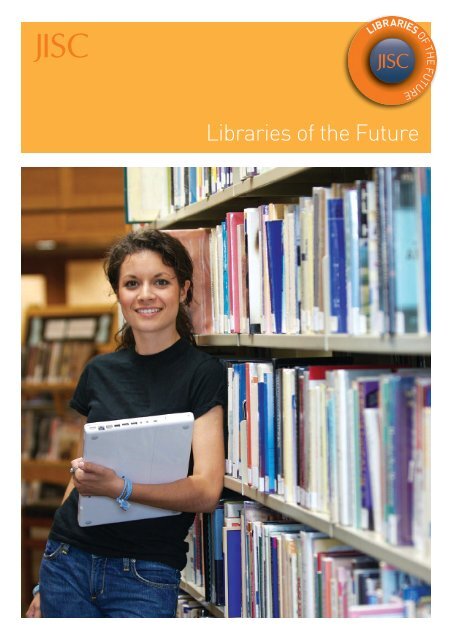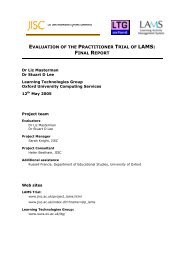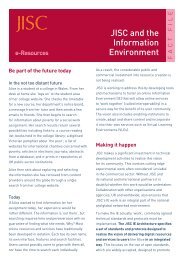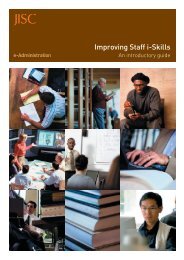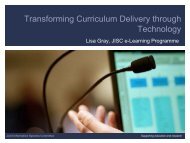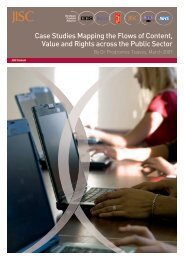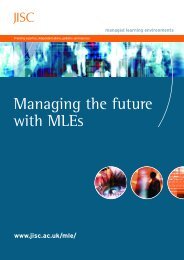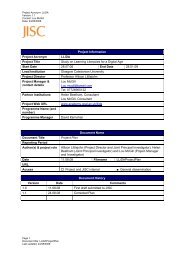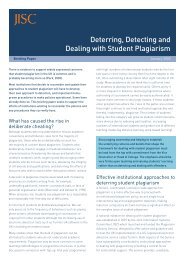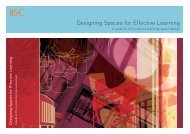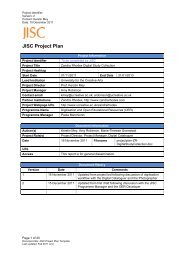Libraries of the Future brochure - Jisc
Libraries of the Future brochure - Jisc
Libraries of the Future brochure - Jisc
Create successful ePaper yourself
Turn your PDF publications into a flip-book with our unique Google optimized e-Paper software.
<strong>Libraries</strong> <strong>of</strong> <strong>the</strong> <strong>Future</strong>
2 | <strong>Libraries</strong> <strong>of</strong> <strong>the</strong> <strong>Future</strong><br />
JISC campaigns<br />
For many years technology has been transforming education and research,<br />
bringing about pr<strong>of</strong>ound changes to <strong>the</strong> ways in which learners, teachers,<br />
librarians, administrators and researchers undertake <strong>the</strong>ir work. JISC<br />
campaigns are an attempt to initiate conversations about <strong>the</strong> issues that are<br />
emerging as central to <strong>the</strong> sector.<br />
The fur<strong>the</strong>r and higher education sectors have responded quickly and effectively<br />
to change, harnessing <strong>the</strong> potential <strong>of</strong> technology to support, for example,<br />
access to a wide range <strong>of</strong> online resources, widening participation, more<br />
student-centred approaches to learning, innovative, complex and distributed<br />
research collaborations, and much more. However, many challenges remain.<br />
While some <strong>of</strong> <strong>the</strong>se challenges may be better addressed at <strong>the</strong> institutional<br />
level, o<strong>the</strong>rs may benefit from broader approaches or from national debates<br />
about how technology can be fully integrated into <strong>the</strong> life and work <strong>of</strong> colleges<br />
and universities and help ensure that UK education and research remain among<br />
<strong>the</strong> best in <strong>the</strong> world.<br />
JISC is at <strong>the</strong> forefront <strong>of</strong> many <strong>of</strong> <strong>the</strong> issues that have an impact on education<br />
and research and JISC ‘campaigns’ are an attempt to initiate conversations<br />
– with national organisations and with practitioners, researchers, librarians,<br />
senior managers, administrators and o<strong>the</strong>rs – about <strong>the</strong> issues that are<br />
emerging as central to <strong>the</strong> sector.<br />
As well as <strong>the</strong> <strong>Libraries</strong> <strong>of</strong> <strong>the</strong> <strong>Future</strong> campaign – <strong>the</strong> focus <strong>of</strong> this <strong>brochure</strong> –<br />
JISC recently ran a Student Experiences <strong>of</strong> Technology campaign:<br />
www.jisc.ac.uk/studentexperiences<br />
www.jisc.ac.uk/campaigns
<strong>Libraries</strong> <strong>of</strong> <strong>the</strong> <strong>Future</strong> | 3<br />
Introduction<br />
<strong>Libraries</strong> are at a turning point. As<br />
technology rapidly transforms <strong>the</strong> way<br />
we access information, and resources<br />
are increasingly available online and in<br />
digital formats, <strong>the</strong> established role <strong>of</strong><br />
<strong>the</strong> library as a physical space housing<br />
racks <strong>of</strong> books is looking increasingly<br />
out <strong>of</strong> step with <strong>the</strong> needs <strong>of</strong> students<br />
and researchers.<br />
Allied with technology, library users’<br />
needs and preferences are helping to<br />
drive <strong>the</strong> change in libraries. Students,<br />
researchers and teachers now expect<br />
to be able to access information around<br />
<strong>the</strong> clock, from almost anywhere in<br />
<strong>the</strong> world and via a growing number <strong>of</strong><br />
devices, from laptops to phones.<br />
What does this mean for <strong>the</strong> academic<br />
library as we know it? What will it look<br />
like in 10 years’ time? Will it exist in its<br />
current physical form? What role will<br />
librarians play in supporting learning<br />
and research in <strong>the</strong> digital age?<br />
Through <strong>the</strong> <strong>Libraries</strong> <strong>of</strong> <strong>the</strong> <strong>Future</strong><br />
campaign JISC has opened up <strong>the</strong>se<br />
questions to a stimulating and<br />
enriching discussion. The debate is<br />
grounded in JISC’s commitment to<br />
libraries and <strong>the</strong> services <strong>the</strong>y <strong>of</strong>fer as a<br />
vital part <strong>of</strong> <strong>the</strong> education and research<br />
infrastructure and an essential part<br />
<strong>of</strong> supporting <strong>the</strong> UK’s education<br />
system. The campaign builds on JISC’s<br />
rich history <strong>of</strong> supporting <strong>the</strong> library<br />
sector to work more effectively using<br />
technology and working in partnership<br />
with researchers and educators.<br />
…libraries must<br />
rethink <strong>the</strong> way <strong>the</strong>y<br />
work and <strong>the</strong> way<br />
that <strong>the</strong>y support<br />
learning teaching<br />
and research.<br />
JISC has a long-established reputation<br />
working with libraries in universities<br />
and colleges to put in place change<br />
programmes and to recognise that in <strong>the</strong><br />
age <strong>of</strong> <strong>the</strong> internet and <strong>the</strong> o<strong>the</strong>r digital<br />
opportunities, libraries must rethink<br />
<strong>the</strong> way <strong>the</strong>y work and <strong>the</strong> way that <strong>the</strong>y<br />
support learning, teaching and research.<br />
The <strong>Libraries</strong> <strong>of</strong> <strong>the</strong> <strong>Future</strong> campaign<br />
has taken this debate to a wider<br />
audience, through high-pr<strong>of</strong>ile<br />
debates, publications and newspaper<br />
supplements and through <strong>the</strong> new<br />
technologies <strong>the</strong>mselves, from social<br />
networks to Twitter and Second Life.
4 | <strong>Libraries</strong> <strong>of</strong> <strong>the</strong> <strong>Future</strong><br />
From eLib to <strong>Libraries</strong> <strong>of</strong> <strong>the</strong> <strong>Future</strong><br />
Fur<strong>the</strong>r Information<br />
The eLib report can be found at:<br />
www.jisc.ac.uk/publications/<br />
publications/elibimpactstudyreport.aspx<br />
About <strong>the</strong> eLib programme:<br />
www.jisc.ac.uk/whatwedo/<br />
programmes/elib.aspx<br />
<strong>Libraries</strong> <strong>of</strong> <strong>the</strong> <strong>Future</strong> is <strong>the</strong> latest<br />
stage in JISC’s commitment to<br />
understanding <strong>the</strong> needs <strong>of</strong> library<br />
users and helping librarians and<br />
managers to respond to <strong>the</strong>m. The<br />
campaign emerged from over ten years’<br />
work in supporting and influencing<br />
changes within libraries across <strong>the</strong><br />
education and research sectors.<br />
JISC’s work to support change<br />
in libraries includes <strong>the</strong> influential<br />
Electronic <strong>Libraries</strong> programme (eLib),<br />
which ran between 1995 and 2001<br />
and promoted a cultural change in<br />
academic libraries. The programme<br />
had £15,000,000 <strong>of</strong> funding over three<br />
years and its aim was to ‘transform <strong>the</strong><br />
use and storage <strong>of</strong> knowledge in higher<br />
education institutions’.<br />
Since JISC’s eLib programme,<br />
academic libraries have changed<br />
more than many <strong>of</strong> those involved<br />
ever imagined. Duke & Jordan’s<br />
study for JISC <strong>of</strong> <strong>the</strong> impact <strong>of</strong> eLib<br />
demonstrated not only <strong>the</strong> extent to<br />
which <strong>the</strong> programme had influenced<br />
academic libraries but also how<br />
effective it has been in <strong>the</strong> long term.<br />
The report is based on interviews with<br />
a wide range <strong>of</strong> stakeholders, some<br />
international, and with o<strong>the</strong>rs related to<br />
<strong>the</strong> library business as well as on case<br />
studies <strong>of</strong> ten libraries.<br />
The report shows that eLib promoted<br />
a significant change in UK academic<br />
libraries: it produced a cohort <strong>of</strong><br />
library staff with experience <strong>of</strong><br />
managing sizeable projects that<br />
involved IT, a number <strong>of</strong> whom are<br />
making senior contributions to<br />
librarianship and information services.<br />
The size <strong>of</strong> <strong>the</strong> programme caused<br />
it to permeate <strong>the</strong> whole sector and<br />
<strong>the</strong>refore ready it for later changes,<br />
such as those highlighted by <strong>the</strong><br />
<strong>Libraries</strong> <strong>of</strong> <strong>the</strong> <strong>Future</strong> campaign.<br />
These developments have all helped<br />
academic libraries in <strong>the</strong> UK to<br />
compete globally. The report also<br />
shows that appreciable elements <strong>of</strong><br />
<strong>the</strong> programme have remained alive<br />
and still serve communities <strong>of</strong> users.<br />
The report shows<br />
that eLib promoted a<br />
significant change in UK<br />
academic libraries…
<strong>Libraries</strong> <strong>of</strong> <strong>the</strong> <strong>Future</strong> | 5<br />
JISC: Supporting libraries<br />
JISC funds a range <strong>of</strong> programmes<br />
and projects that support <strong>the</strong> work <strong>of</strong><br />
libraries and drive innovation through<br />
technology. These include:<br />
Digitisation<br />
JISC is changing <strong>the</strong> world <strong>of</strong><br />
authoritative e-resources through its<br />
investment in digitising content from<br />
some <strong>of</strong> <strong>the</strong> UK’s greatest collections.<br />
Spanning centuries, disciplines and<br />
sources, <strong>the</strong> JISC series <strong>of</strong> pioneering<br />
digitisation projects is unlocking a<br />
wealth <strong>of</strong> unique, hard-to-access<br />
material from <strong>the</strong> 16th century to <strong>the</strong><br />
present day, creating a critical mass <strong>of</strong><br />
rich, permanent digital resources for <strong>the</strong><br />
benefit <strong>of</strong> <strong>the</strong> widest user base possible<br />
within UK fur<strong>the</strong>r and higher education.<br />
www.jisc.ac.uk/whatwedo/campaigns/<br />
libraries<strong>of</strong><strong>the</strong>future/digitisation<br />
e-Books<br />
The JISC national e-books observatory<br />
project is engaging directly with<br />
librarians, publishers and o<strong>the</strong>rs to<br />
assess impacts, observe behaviours<br />
and develop new models to stimulate<br />
<strong>the</strong> e-books market, and do all this in a<br />
managed environment.<br />
www.jisc.ac.uk/whatwedo/campaigns/<br />
libraries<strong>of</strong><strong>the</strong>future/ebooks<br />
Repositories<br />
Repositories are rapidly emerging<br />
as a key element <strong>of</strong> research and<br />
o<strong>the</strong>r institutional infrastructures and<br />
libraries are playing a central role in<br />
<strong>the</strong>ir establishment and development,<br />
providing an important service to<br />
teaching and research staff that<br />
enables <strong>the</strong>m to make <strong>the</strong>ir work<br />
openly available, is easy to use and fits<br />
with existing workflows.<br />
www.jisc.ac.uk/whatwedo/campaigns/<br />
libraries<strong>of</strong><strong>the</strong>future/repositories<br />
Digital Preservation<br />
Digital preservation is a strategic<br />
and collaborative undertaking<br />
requiring a range <strong>of</strong> approaches and<br />
skills and <strong>the</strong> active involvement <strong>of</strong><br />
library, administrative, technical and<br />
managerial staff roles at various levels<br />
<strong>of</strong> responsibility. Librarians are at <strong>the</strong><br />
heart <strong>of</strong> <strong>the</strong>se collaborative networks,<br />
building on already established<br />
infrastructure and communication<br />
channels, and helping to ensure that<br />
digital preservation is mainstreamed as<br />
an institutional priority.<br />
www.jisc.ac.uk/whatwedo/campaigns/<br />
libraries<strong>of</strong><strong>the</strong>future/preservation<br />
Research Data<br />
Modern scientific research generates<br />
vast quantities <strong>of</strong> data, which must<br />
be stored, managed and curated<br />
properly if we and future generations<br />
are to reap <strong>the</strong> rewards <strong>of</strong> substantial<br />
research investments. Given <strong>the</strong><br />
central importance <strong>of</strong> research data<br />
and <strong>the</strong>ir management, libraries can<br />
position <strong>the</strong>mselves as a key element<br />
<strong>of</strong> research and o<strong>the</strong>r institutional<br />
infrastructures and bring key skills<br />
(such as in curation and metadata) to<br />
bear on a challenging topic that is high<br />
on <strong>the</strong> international agenda.<br />
www.jisc.ac.uk/whatwedo/campaigns/<br />
libraries<strong>of</strong><strong>the</strong>future/research<br />
Diversity and Equality<br />
Ensuring that all students receive<br />
<strong>the</strong> highest level <strong>of</strong> service is a vital<br />
part <strong>of</strong> <strong>the</strong> mission <strong>of</strong> libraries and<br />
learning resource centres. Not only a<br />
question <strong>of</strong> legal compliance, it is, more<br />
importantly, a matter <strong>of</strong> equality and<br />
fairness. Academic libraries are at <strong>the</strong><br />
forefront <strong>of</strong> ensuring that students and<br />
staff with disabilities and/or learning<br />
difficulties are not disadvantaged.<br />
JISC TechDis has for many years been<br />
working to support cultural change in<br />
this area.<br />
www.jisc.ac.uk/whatwedo/campaigns/<br />
libraries<strong>of</strong><strong>the</strong>future/diversity<br />
The Google Generation<br />
The JISC/British Library work on <strong>the</strong><br />
Google generation considers whe<strong>the</strong>r,<br />
as a result <strong>of</strong> <strong>the</strong> digital transition<br />
and resources being created digitally,<br />
young people, <strong>the</strong> ‘Google generation’,<br />
are searching for and researching<br />
content in new ways and if so, how this<br />
will shape <strong>the</strong> way <strong>the</strong>y research and<br />
search in <strong>the</strong> future. It also addresses if<br />
new ways <strong>of</strong> searching and researching<br />
for content will prove to be any different<br />
from <strong>the</strong> way that existing researchers/<br />
scholars work.<br />
www.jisc.ac.uk/whatwedo/programmes/<br />
resourcediscovery/googlegen.aspx
6 | <strong>Libraries</strong> <strong>of</strong> <strong>the</strong> <strong>Future</strong><br />
The <strong>Libraries</strong> <strong>of</strong> <strong>the</strong> <strong>Future</strong><br />
campaign<br />
In an information world in which<br />
Google apparently <strong>of</strong>fers us<br />
everything, what place is <strong>the</strong>re<br />
for <strong>the</strong> traditional, and even <strong>the</strong><br />
digital, library?<br />
In a library environment that<br />
is increasingly moving to <strong>the</strong><br />
delivery <strong>of</strong> online ra<strong>the</strong>r than<br />
print resources, what <strong>of</strong> <strong>the</strong><br />
academic library’s traditional<br />
place at <strong>the</strong> heart <strong>of</strong> campus life?<br />
What about <strong>the</strong> impact <strong>of</strong> repositories<br />
and Open Access on <strong>the</strong> delivery <strong>of</strong><br />
library resources?<br />
And <strong>the</strong> need to digitise and make<br />
more widely accessible key scholarly<br />
resources?<br />
And what <strong>of</strong> <strong>the</strong> calls for libraries to<br />
play a central role in <strong>the</strong> promotion <strong>of</strong><br />
‘information literacy’?<br />
Through <strong>Libraries</strong> <strong>of</strong> <strong>the</strong> <strong>Future</strong><br />
campaign JISC has opened up – with<br />
partner organisations and librarians<br />
<strong>the</strong>mselves – a debate about <strong>the</strong> future<br />
<strong>of</strong> <strong>the</strong> academic and research library<br />
that has tackled all <strong>the</strong>se urgent<br />
questions head on.<br />
…a debate that<br />
has tackled all <strong>the</strong>se<br />
urgent questions<br />
head on.<br />
The campaign has encompassed<br />
events, printed resources, including a<br />
Guardian supplement, and podcasts,<br />
with <strong>the</strong> emphasis on <strong>the</strong> involvement<br />
<strong>of</strong> everyone whose lives are touched<br />
by libraries.<br />
Like all JISC campaigns, <strong>Libraries</strong><br />
<strong>of</strong> <strong>the</strong> <strong>Future</strong> performs a number <strong>of</strong><br />
functions, from raising awareness to<br />
generating discussion. Making <strong>the</strong> most<br />
<strong>of</strong> economies <strong>of</strong> scale, it also has <strong>the</strong><br />
added benefit <strong>of</strong> letting decision-makers<br />
know what is already available from<br />
JISC while helping JISC to determine<br />
what areas need fur<strong>the</strong>r work.<br />
For librarians, <strong>the</strong> debate allows<br />
<strong>the</strong> pr<strong>of</strong>ession to pool expertise, test<br />
<strong>the</strong>ories and disseminate ideas. It<br />
enables library leaders to rise above<br />
operational issues and engage in real<br />
strategic thinking.<br />
For student information practitioners,<br />
it <strong>of</strong>fers <strong>the</strong> opportunity to have an input<br />
into <strong>the</strong> future <strong>of</strong> <strong>the</strong> pr<strong>of</strong>ession that is<br />
changing even as <strong>the</strong>y train to join it.<br />
For users <strong>of</strong> library services, <strong>the</strong><br />
debate allows <strong>the</strong>m to have <strong>the</strong>ir voice<br />
heard and <strong>of</strong>fers reassurance that<br />
<strong>the</strong>ir constantly evolving learning,<br />
research and teaching needs are being<br />
considered – now and in <strong>the</strong> future.
<strong>Libraries</strong> <strong>of</strong> <strong>the</strong> <strong>Future</strong> | 7<br />
<strong>Libraries</strong> <strong>of</strong> <strong>the</strong> <strong>Future</strong> activities<br />
Printed resources: read <strong>the</strong><br />
debate<br />
Guardian supplement: <strong>Libraries</strong><br />
Unleashed<br />
Articles explore open access, <strong>the</strong><br />
phenomenon <strong>of</strong> ‘Library 2.0 – <strong>the</strong><br />
integration <strong>of</strong> user generated content<br />
with traditional library content – e-books,<br />
new business models, digitisation, digital<br />
preservation and more.<br />
http://education.guardian.co.uk/<br />
librariesunleashed<br />
CILIP supplement<br />
Articles <strong>of</strong>fer an insight into <strong>the</strong> vital<br />
but <strong>of</strong>ten behind-<strong>the</strong>-scenes services<br />
that JISC provides as an agent <strong>of</strong><br />
transformational change across UK<br />
higher education as a whole.<br />
Survey <strong>of</strong> Librarian Staff<br />
The survey showed that senior<br />
academic librarians believe that<br />
managing and promoting e-resources<br />
and e-content will be <strong>the</strong>ir main<br />
challenges over <strong>the</strong> next few years.<br />
www.jisc.ac.uk/publications/documents/<br />
attitudinalsurvey2008librariansreport<br />
JISC/SCONUL Library Management<br />
Systems study<br />
Briefing paper and report on library<br />
management systems procurement<br />
www.jisc.ac.uk/publications/<br />
documents/librarymanagementbp<br />
Podcasts: listen to <strong>the</strong> debate<br />
University <strong>of</strong> Oxford and Harvard<br />
University talk <strong>the</strong> future <strong>of</strong> libraries<br />
OCLC’s vice-president, Karen Calhoun,<br />
talks libraries, <strong>the</strong> future and learning<br />
Information literacy <strong>the</strong> ‘democratic<br />
right’ <strong>of</strong> every learner, say Scottish<br />
experts<br />
An interview with Lynne Brindley<br />
Listening to students – Innovative<br />
responses<br />
Library spaces for <strong>the</strong> ‘Google<br />
Generation’<br />
Beyond <strong>the</strong> Google Generation report –<br />
next steps<br />
Supporting users with disabilities –<br />
challenges and opportunities<br />
Creating 21st century learning spaces<br />
Towards <strong>the</strong> research library <strong>of</strong> <strong>the</strong><br />
future<br />
Google and librarians – A transatlantic<br />
discussion<br />
Find all <strong>the</strong>se podcasts, and more,<br />
here: www.jisc.ac.uk/whatwedo/<br />
campaigns/libraries<strong>of</strong><strong>the</strong>future/<br />
podcasts<br />
Web 2.0: Join <strong>the</strong> debate<br />
Blog: http://libraries<strong>of</strong><strong>the</strong>future.<br />
jiscinvolve.org<br />
Social network: http://<br />
libraries<strong>of</strong><strong>the</strong>future.ning.com<br />
Events<br />
What is <strong>the</strong> Library <strong>of</strong> <strong>the</strong> <strong>Future</strong>?<br />
Watch <strong>the</strong> video <strong>of</strong> this debate here:<br />
www.jisc.ac.uk/whatwedo/campaigns/<br />
libraries<strong>of</strong><strong>the</strong>future/debate<br />
National E-textbook Debate<br />
From eLib to <strong>the</strong> Library <strong>of</strong> <strong>the</strong> <strong>Future</strong><br />
Challenges for <strong>the</strong> Digital Librarian<br />
Find reports and audio from<br />
<strong>the</strong>se events here: http://<br />
libraries<strong>of</strong><strong>the</strong>future.jiscinvolve.org/<br />
category/jiscconference08
8 | <strong>Libraries</strong> <strong>of</strong> <strong>the</strong> <strong>Future</strong><br />
Debating libraries <strong>of</strong> <strong>the</strong> future<br />
In April 2009, in Oxford, JISC held a<br />
high-pr<strong>of</strong>ile debate on <strong>the</strong> future <strong>of</strong><br />
libraries. Expert speakers included<br />
Sarah Thomas, head <strong>of</strong> Oxford’s<br />
Bodleian Library, Robert Darnton,<br />
head librarian at Harvard University,<br />
and Santiago de la Mora, European<br />
Partnerships Lead at Google UK.<br />
In front <strong>of</strong> an audience in <strong>the</strong> lecture<br />
<strong>the</strong>atre and a virtual audience in<br />
Second Life, where <strong>the</strong> event was also<br />
broadcast, and via <strong>the</strong> blogosphere and<br />
Twitterverse, participants from across<br />
<strong>the</strong> world considered some <strong>of</strong> <strong>the</strong> key<br />
challenges that will shape <strong>the</strong> library <strong>of</strong><br />
<strong>the</strong> future if it is to survive.<br />
The speakers tackled some <strong>of</strong> <strong>the</strong><br />
key issues <strong>of</strong> <strong>the</strong> campaign, from<br />
<strong>the</strong> new skills required for libraries<br />
to remain relevant and visible, to<br />
fostering partnerships between<br />
public and private; discerning users’<br />
increasingly diverse needs; and how to<br />
meet <strong>the</strong> future information needs <strong>of</strong><br />
researchers given <strong>the</strong> changing models<br />
<strong>of</strong> scholarly communication.<br />
Video <strong>of</strong> <strong>the</strong> full debate can be seen here:<br />
www.jisc.ac.uk/whatwedo/campaigns/<br />
libraries<strong>of</strong><strong>the</strong>future/debate<br />
If you’re standing still, change<br />
looks fast. If you go with <strong>the</strong> flow, it<br />
will seem effortless. <strong>Libraries</strong> remain<br />
thrilling places and <strong>the</strong> future <strong>of</strong> <strong>the</strong><br />
library is bright. <strong>Libraries</strong> will continue to evolve<br />
but remain true to connecting knowledge-seekers<br />
with <strong>the</strong> accumulated knowledge <strong>of</strong> <strong>the</strong> past for <strong>the</strong><br />
advancement <strong>of</strong> individuals and society.<br />
Sarah Thomas, Bodleian’s librarian and director, Oxford University Library Services<br />
The librarian <strong>of</strong> <strong>the</strong> future will<br />
not come from <strong>the</strong> librarian <strong>of</strong> <strong>the</strong><br />
present. The librarian <strong>of</strong> <strong>the</strong> future<br />
will be a revolutionary.<br />
Peter Murray Rust, Unilever Centre for Molecular Informatics
<strong>Libraries</strong> <strong>of</strong> <strong>the</strong> <strong>Future</strong> | 9<br />
We must digitise<br />
and democratise. The<br />
problem with many<br />
libraries is that <strong>the</strong>y<br />
serve a particular body, for example<br />
students. We need to open <strong>the</strong>m<br />
up – not by opening physical doors,<br />
but through digitisation. The point<br />
is not to turn our backs on <strong>the</strong><br />
world but to make <strong>the</strong> most <strong>of</strong> this<br />
extraordinarily rich university setting<br />
in order to share <strong>the</strong> wealth.<br />
Robert Darnton, Harvard University librarian<br />
Librarians are very well-placed<br />
to make a difference and secure an<br />
enviable reputation for our pr<strong>of</strong>ession<br />
if we continue to watch, listen, think,<br />
analyse, collaborate, share, test and try and if we<br />
deploy real leadership skills, displaying a genuine<br />
willingness to keep reinventing ourselves and our<br />
old skills to match <strong>the</strong> changing environment we<br />
find ourselves in at any stage.<br />
Jean Sykes, chief librarian and information services director<br />
at <strong>the</strong> London School <strong>of</strong> Economics
10 | <strong>Libraries</strong> <strong>of</strong> <strong>the</strong> <strong>Future</strong><br />
Where next for <strong>Libraries</strong> <strong>of</strong> <strong>the</strong> <strong>Future</strong>?<br />
The question that JISC is addressing<br />
at <strong>the</strong> moment is: how do we build <strong>the</strong><br />
future and what should that future<br />
look like? We are at a time <strong>of</strong> immense<br />
change in <strong>the</strong> way that people think<br />
about academic libraries. We are<br />
faced with challenges <strong>of</strong> reduced<br />
resource and ever-growing expectation<br />
from end-users, in a world where<br />
<strong>the</strong> ubiquitous search engines have<br />
created an impression that all content<br />
is available at <strong>the</strong> click <strong>of</strong> a mouse,<br />
instantly and for free. Leaders in<br />
libraries are asking <strong>the</strong>mselves hard<br />
questions about <strong>the</strong>ir future priorities –<br />
what kind <strong>of</strong> service will <strong>the</strong>y provide in<br />
five years or ten years? What services<br />
are core business and which can be<br />
withdrawn? Can services be shared<br />
between institutions on a regional or<br />
national level, or by institutions that<br />
share a similar mission?<br />
Each library needs to drive forward its<br />
own strategy for how it responds to <strong>the</strong><br />
changes afforded and challenges posed<br />
by <strong>the</strong> digital environment, including<br />
<strong>the</strong> choice <strong>of</strong> where it makes sense to<br />
share infrastructure, services and even<br />
people. At <strong>the</strong> same time, we know that<br />
<strong>the</strong>re is huge potential in coordinating<br />
activity between libraries. The UK<br />
library sector has a strong track record<br />
in taking this approach, but we can do<br />
much more – and now is <strong>the</strong> time to put<br />
this into place.<br />
JISC is working with thought leaders<br />
in <strong>the</strong> library world to debate <strong>the</strong><br />
following questions:<br />
• What might a UK library<br />
infrastructure look like in five or<br />
ten years – at a local, regional and<br />
national level?<br />
• Which digital services might be<br />
prioritised for sharing between<br />
institutions and which need to be<br />
retained ‘in-house’?<br />
• Is <strong>the</strong> current resource discovery<br />
infrastructure still fit for purpose –<br />
and if not, how should it change?<br />
• What might a future library<br />
management system include?<br />
• How can libraries support <strong>the</strong><br />
increased need for support <strong>of</strong><br />
research and learning in <strong>the</strong> digital<br />
world?<br />
• How can <strong>the</strong> library use technology<br />
to play an active role in knowledge<br />
transfer to o<strong>the</strong>r sectors?<br />
To move from <strong>the</strong> present library to<br />
what is required in <strong>the</strong> future is an<br />
immense challenge at three levels:<br />
people, processes and infrastructure.<br />
JISC will use <strong>the</strong> outcomes from <strong>the</strong><br />
debate to guide institutions in how to<br />
plan <strong>the</strong>ir futures.<br />
Sarah Porter, JISC Head <strong>of</strong> Innovation<br />
JISC is driving<br />
innovation in libraries<br />
through technology.<br />
We see technology<br />
as both an enabler <strong>of</strong><br />
change as well as a<br />
change agent in itself<br />
so technology can help<br />
people to do things<br />
better but, also, people<br />
will have to change<br />
to use technology<br />
effectively.
<strong>Libraries</strong> <strong>of</strong> <strong>the</strong> <strong>Future</strong> | 11<br />
Fur<strong>the</strong>r information<br />
Key organisations<br />
British Library<br />
www.bl.uk<br />
Research Information Network<br />
www.rin.ac.uk<br />
Research <strong>Libraries</strong> UK<br />
www.rluk.ac.uk<br />
SCONUL<br />
www.sconul.ac.uk<br />
A selection <strong>of</strong> JISC and o<strong>the</strong>r<br />
resources<br />
Digitisation<br />
JISC Digitisation programme<br />
www.jisc.ac.uk/digitisation<br />
‘Digitisation in <strong>the</strong> UK’<br />
www.jisc.ac.uk/uploaded_documents/<br />
JISC-Digi-in-UK-v1-final.pdf<br />
Licensing<br />
JISC Collections<br />
www.jisc-collections.ac.uk<br />
Knowledge Exchange<br />
www.knowledge-exchange.info/<br />
Default.aspx?ID=154<br />
Strategic Content Alliance<br />
www.jisc.ac.uk/whatwedo/<strong>the</strong>mes/<br />
eresources/contentalliance.aspx<br />
e-books<br />
www.jiscebooksproject.org<br />
Resource Discovery<br />
Google Generation report<br />
www.jisc.ac.uk/whatwedo/<br />
programmes/resourcediscovery/<br />
googlegen<br />
JISC Resource Discovery programme<br />
www.jisc.ac.uk/whatwedo/<br />
programmes/resourcediscovery<br />
Library Management Systems<br />
JISC and SCONUL Library Management<br />
Systems Study<br />
www.jisc.ac.uk/whatwedo/<br />
programmes/resourcediscovery/<br />
libraryMS<br />
Repositories<br />
JISC Repositories programme<br />
www.jisc.ac.uk/whatwedo/<br />
programmes/digitalrepositories2007<br />
Repositories Support Project<br />
www.rsp.ac.uk<br />
Sherpa<br />
www.sherpa.ac.uk<br />
Library spaces<br />
JISC’s Design for Effective Learning<br />
www.jisc.ac.uk/whatwedo/<br />
programmes/elearning_innovation/<br />
eli_learningspaces<br />
SCONUL Library Design Award<br />
www.sconul.ac.uk/groups/space_<br />
planning/design_award<br />
e-Lib<br />
e-Lib evaluation report<br />
www.jisc.ac.uk/publications/<br />
publications/elibimpactstudyreport<br />
For fur<strong>the</strong>r information, please go to:<br />
www.jisc.ac.uk
<strong>Libraries</strong> <strong>of</strong> <strong>the</strong> <strong>Future</strong><br />
This document is available in alternative formats<br />
For more information: www.jisc.ac.uk/libraries<strong>of</strong><strong>the</strong>future<br />
Fur<strong>the</strong>r information about JISC:<br />
Web: www.jisc.ac.uk<br />
Email: info@jisc.ac.uk<br />
Tel: +44 (0)117 331 0789<br />
Document No: 589<br />
Version 1.1, June 2009


